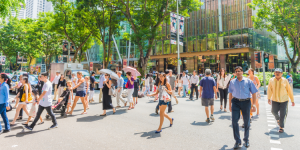
Inflation continues rampaging over the world's economies, causing significant rises in commodity prices, soaring real estate values and growing inequalities almost everywhere. Earlier this year, Mercer published its 28th ranking of the most expensive African cities for expatriates, and the results are quite discouraging. Here's what expats have to say about the cost of living in African countries.
An ever-rising cost of living
Bangui, the capital of the Central African Republic (CAR) ranked first in the Mercer report, ahead of Ndjamena, the capital of Chad, 13th this year. Needless to say, locals and expatriates in the Central African Republic are far from happy. Moreover, the country is entering a new episode of political turmoil with, on the one side, a president who is determined to stay in power. On the other hand, you have Danièle Darlan, president of the Constitutional Court, who is committed to upholding the law and opposed to the reforms sought by the president. This is an open war that leaves no one unaffected. This crisis has kicked in, in addition to the one the country has been going through since COVID. A simple visit to the markets in Bangui exposes the extent of the problem. The price of oil has almost doubled. Other raw materials and imported products are experiencing similar increases. Even the price of cassava, a staple food, is on the rise. "Everything is expensive here," say locals and expatriates who agree that life is even more expensive for more modest and vulnerable households. Precariousness is on the rise, even though the Central African Republic is believed to be "the next oil reserve in sub-Saharan Africa.".
Who benefits from oil exploitation?
The most expensive African cities are also those where oil flows abundantly. Abidjan, the ninth most expensive African city for expatriates, is running for the title of oil and gas powerhouse of the continent. Last year, the Italian company ENI and the Ivorian company Petroci Holding discovered a large oil field that they nicknamed "the whale". Another discovery was made last July, which could turn Ivory Coast into an oil powerhouse by 2023, according to the Ivorian government. But who will reap the benefits?
Pacome is not an expatriate but an Ivorian citizen. He wonders about the growing inequalities, which are becoming increasingly visible in Abidjan. "The high cost of living is something we all experience at all levels. Today, life in Ivory Coast has become a race. You can't expect tomorrow because here in Abidjan, nothing is done to reduce the cost of living."
Brazzaville is another city with growing inequalities. Daniel, an expatriate in Congo-Brazzaville, confirms: "To know if life is expensive or not, it depends on your choices in terms of lifestyle. For the average Congolese, given the very low salary levels in general, and if you compare with Europe, for example, life is very expensive. For an expat, life is not that expensive because many products are quite affordable when you compare the local prices to euros."
The Congolese capital, which ranks 10th in the Mercer report, officially produced 344,000 barrels of oil last year. This remarkable achievement places it third in Africa in terms of oil production, behind Nigeria and Angola. But the financial windfall only benefits some. In Pointe-Noire, a coastal city where oil industries are located, about 40% of urban dwellers have access to electricity, compared to 10% in rural areas.
Real estate prices are soaring
Abouvenus has retired in Morocco and considers himself privileged: "The cost of living can be very high for Moroccans, but not for us expat retirees with a decent and higher income, improved by the exchange rate and the tax rebate. In any case, everyday prices in Morocco are much lower than in France."
The Mercer report ranks Casablanca as the 21st most expensive African city for expatriates. The inflationary surge (6.3 for the whole year, more than 8% in September) has pushed the Central Bank of Morocco to act. The price hike has affected basic necessities: +2.7% on oil, +2.1% on milk, cheese and eggs. Even higher rises have been recorded in Casablanca, Marrakech, Meknes and Beni Mellal. What these cities have in common is that they attract tourists and expats.
Expats are also facing soaring property prices. Popular among tourists, the large coastal city of Dar Es Salaam in Tanzania is the 28th most expensive city in Africa. Although Zanzibar does not appear in the ranking, life is no less expensive there. Steff, an expat, shares his thoughts: "I have been living in Paje, a village on the Tanzanian island of Unguja, for 7 years. In the last two years, there has been construction almost everywhere, and it is not uncommon to find a "normal" house on 1000m² of land for 250,000 USD". Depending on whether it is coastal land or not, prices can triple or go beyond. The country is trying to catch up with Mauritius and Seychelles by attracting more large foreign investors.
But the Blue Amber Resort affair leaves investors in Tanzania in disarray. Following a land dispute, the government recently canceled the project of British developer Pennyroyal, leaving many small investors in distress. As a matter of fact, many Japanese, Brazilian, German expatriates, among others, thought they would soon move into their Blue Amber villa. The first homes were expected in December. But the government wants to reassure them. “Even if the land lease is suspended, the investment permit is still valid", says the government.
However, for these expatriates, things are much more complex than they seem. Some have invested all their savings, while others were hoping to spend their retirement time in Zanzibar.
Quality of life comes at a price
Many expats in African countries agree on a common point: The cost of living is higher everywhere. Motard.54, an expatriate in Mauritius, explains: "The cost of living has changed a lot since we arrived in 2018. Overall, our budget has increased by no less than 15% without our habits changing. Imported products, fuel, and even school fees have significantly changed. Given the often-lower income here and compared to Europe, where we come from, we surely need to be more attentive. The budget requires precise management." Port-Louis, the capital of Mauritius, ranks 35th among the wealthiest cities in Africa.
How do expatriates in Mauritius feel about this? Gemaed and Marin have worked out their maths. According to them, it would take "35%" more income than in France to live in Mauritius "comfortably". Marin does not live in Mauritius but wanted to move to Reunion Island. "A few months ago, I was thinking of moving to Reunion Island with my wife and my 7-year-old daughter. I have a small pension of 1500 euros, and my wife is unemployed. I wanted to spend the coming years under the tropics, but in the end, I gave up." Marin had applied for a position as a masonry trainer but had no response. "Just too bad," he said.
Motard.54 stays positive. By his standards, despite the rising prices, living in Mauritius is still much more affordable than elsewhere. "Concretely, life is still much more affordable than in Europe, where everything has increased and continues to increase. I would say that the standard of living for an expat is still much better here. And if we compare it to our Mauritian friends, complaining would be inappropriate. So yes, life can be expensive in Mauritius, but there are many things you can do to limit your expenses. This relatively high cost is literally the price to pay for being and staying on this beautiful island."
Nathalie, an expat living in Senegal, shares a similar view. As a reminder, Dakar, the capital of Senegal, is the 8th most expensive city in Africa. "Although food prices have increased, life is still much more affordable than in France. For the moment, there is nothing to complain about." She says. For Bellino, who has been living in Tunisia for 9 years: "The cost of living has increased a lot". Tunis is the 46th and last most expensive city in Africa. However, leaving isn't even an option for him. The cost of living in Tunisia is still lower than in other countries. And for Bellino, happiness also means the family, the beautiful villa and the climate".



















